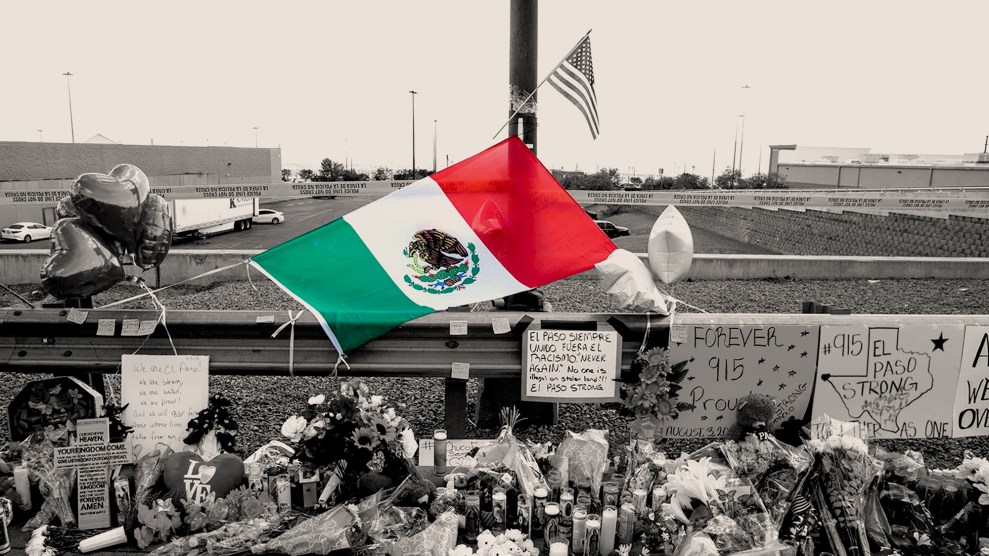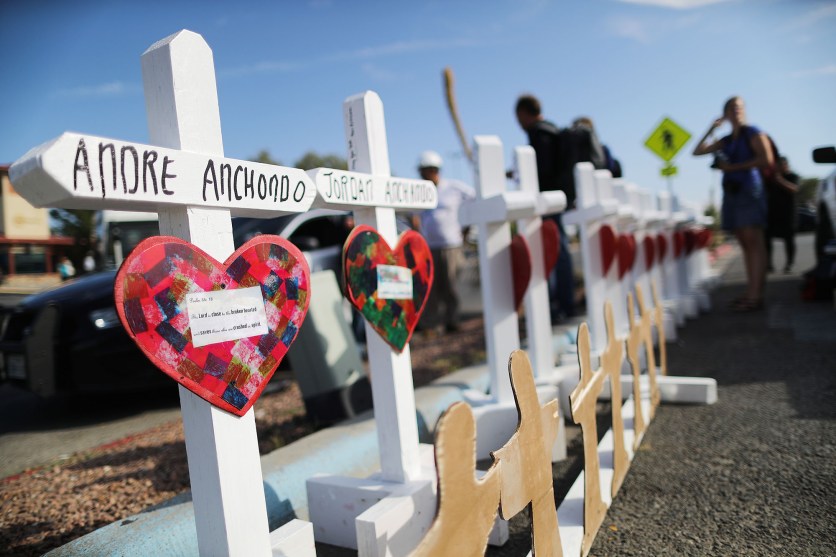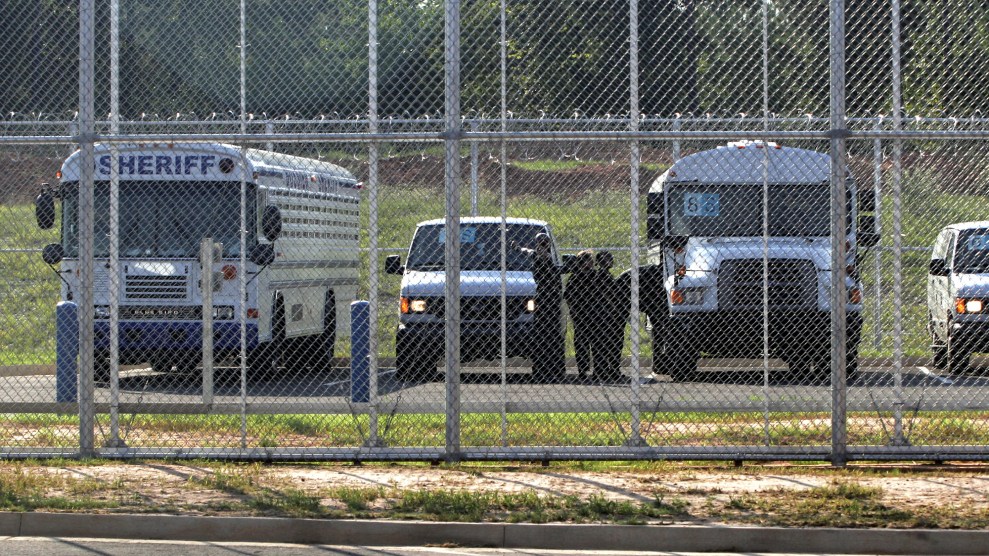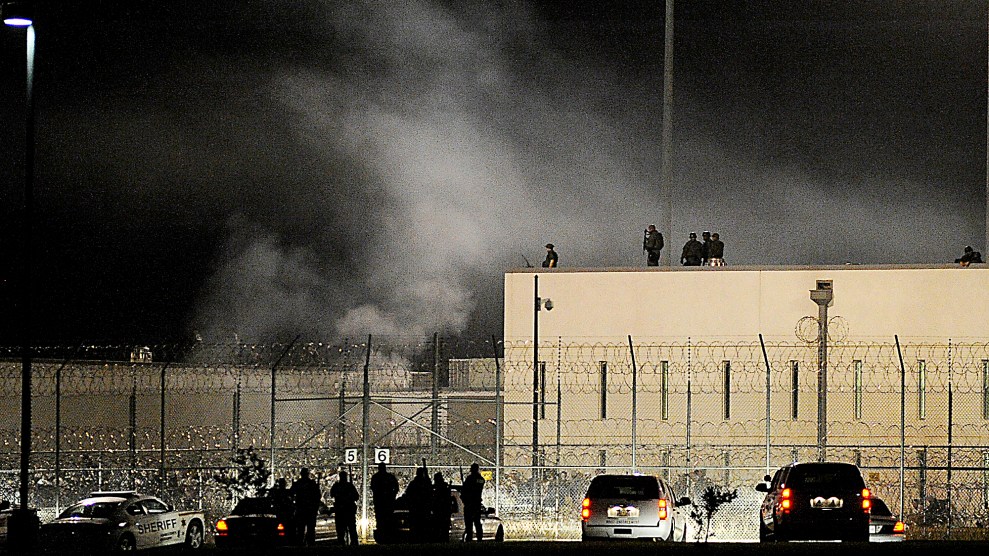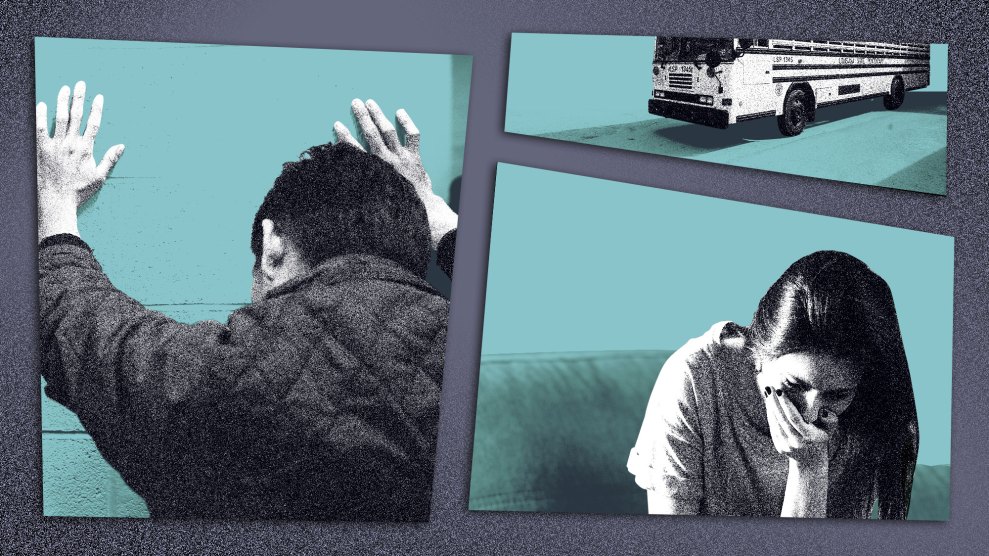
Mother Jones illustration; Getty
On the morning of August 7, Armando thought about skipping work. He had been up late with his 2-year-old twin boys in their central Mississippi home and had barely gotten any sleep. Since migrating to the United States in 2002, Armando had built a life here: married, bought a house, and had five kids. He had a job as a mechanic at Peco Foods, tasked with machine maintenance for the chicken processing plant. Around 6 a.m. that Wednesday, he walked into work.
At the same time, his 14-year-old daughter, Julia, was waking up and getting ready for her second day of high school. “It was really chaotic,” she told me. She was sitting in her first-period world history class, waiting for the bell to ring, when she got called to the office. Her father had been detained in what was one the largest ICE raids in modern history.
Armando and Julia, whose names have both been changed, talked to Mother Jones about what happened that day and how they’re picking up the pieces in the aftermath of the raid. These interviews have been edited for length and clarity.
Julia: The bus comes at seven o’clock, and I have to help with my sister and my brother. My mom leaves for work at night. My dad always leaves at five o’clock in the morning. That morning, I called my dad to ask him what time my mom was going to get home. That was like 6:55, close to when the bus was coming. That was the last time I talked to him.
Armando: Around 8 a.m., suddenly, they started yelling, “Everyone outside! Everyone outside!” I was on my way out when someone said, “That’s ICE. We have to hide.” Some went to hide. I was going to go hide, but then I thought, “What’s the point?” They took us into the break room. When they grabbed us, they asked, “Are you Hispanic? Okay, go over there. Anyone who’s Hispanic, go over there.” They divided us one by one. Whether or not they were here legally, they put everyone to one side.
One agent started taking down everyone’s names. He got there and said, “Tell me your name, your real name, where you’re from, and don’t lie to me. The more you lie, the bigger your problems will be.” I gave him my full name and everything. They only asked for a name. They didn’t ask for any papers. In other plants, I’ve heard they even pulled out their guns. After they asked our names, they sat us down. They tied our feet together and our hands together and they put us on a bus. We got onto the buses, and they took us to Jackson. They took us by the airport where the military base is.
Julia: I was the first one to find out of my family. They called me to the office. At first, I thought I did something wrong. They called me, and they called my friend in, too. They got her mom, and they got my dad. My dad’s friend was there waiting for me. They said, “They got your dad.” At first, I thought they were joking. I was like, “Who got my dad?” And they said, “ICE got your dad.” I guess I was shocked. I was speechless. I didn’t believe them at first. But then I stared at their faces. They were serious, and it looked like they were just crying. That’s when I broke down.
I checked my phone and there were all these messages. The school was trying to call my mom but my mom wasn’t answering at all. No one was answering the phone. So I called my mom. She wasn’t answering. I called my uncle until he answered, and that’s when I was able to tell my mom. I felt guilty. I felt like it was my fault because I was going to have my birthday party in a few weeks. My parents had been working extra hours and all that. I felt guilty. I thought it was my fault because they were working extra hard to get the money to plan the party for me.
I wasn’t really thinking about me. I was thinking more about my dad. I was in the counselor’s office waiting for my mom to pick me up. I was just waiting for something to happen. I was getting impatient sitting there doing nothing. I was just waiting. I was just distant. I was mad at myself. I was blaming myself for it. I was thinking it was my fault. I just went to the corner of the room and stayed there. An hour later, I got checked out of school, like at 11.
Armando: I was probably on the bus about seven or eight hours. They fed us around four in the afternoon. They gave us a sandwich, water, and a bag of chips. The whole time we had our hands and our feet tied up. I remember I filled out some paper asking for my name, where I was working, how many kids I had, where I was from, if I was scared to go back to my country. When I got off the bus the second time, they asked me for my name and told me to put down my fingerprints. That’s when they took us to an immigration agent. They asked where I was from, my kids’ names, how many kids I had in the US, how many years I’ve been here. I have five kids. I didn’t know anything about them. I didn’t know what was going to happen. We were all depressed and discouraged.
Julia: Before we went, my dad called us and said that they took him to the National Guard. He said it was the one besides the airport. There’s like four bases here. We just kept looking until we found it. We were just looking for the bus. They gave us a card with a hotline. So we called that number, and they were just saying to call back later. We asked the guards, “Are they there?” and one of them said, “That’s a confidential thing. We can’t say.” They really didn’t want to cooperate. We called that hotline. It was like eight o’clock at night, and I gave them the information that they asked for, and they said, “We don’t know anything about him. We don’t know where he’s at.” Supposedly that hotline was to get information, but they didn’t give me any information. They always said at the end of the call that they would call us back. They never call you back.
I was translating. I’m used to it. I always translate for other things, like doctor’s appointments. This time it felt like more pressure. I felt like if I messed up, then it might cause him not to come back or him to get deported. It was supposed to be an adult, not me. I shouldn’t really be worrying about it. We’re not doing anything wrong. Just because some people make mistakes doesn’t mean all Hispanics are mean people. It doesn’t mean that.
Armando: I don’t speak English very well, but the immigration agent understood me, and I understood him a bit, too. “I have four kids,” he said. “And I’m sorry you’re going through this.” Then his boss came by, and he said, “He has five kids. He hasn’t heard anything about them or his wife. I think we could let him go.” But there was one condition. “We’re going to put an ankle bracelet on you.” They gave me a date and a case number. They told me I needed to show up again on December 10, but they said they might contact me before then. They just told me not to move. They took me back to the plant where I was working around midnight. I got back home around two in the morning. I was so happy. I just wanted to see my kids.
Julia: My brothers and my sister were all asleep when he got back. I didn’t want to sleep at all, so I was awake with my mom. We were happy, but I was nervous. I’m the nervous one in the family. My brother was just staring, not saying anything. He isn’t too talkative. He won’t show his feelings at all. My mom, she’s sensitive, but she won’t show it to anyone. She was just acting strong. She was holding back her tears, saying, “It’s fine. This was going to happen. Everything’s okay now.”
Armando: Right now, I don’t have a job. My wife is the only one working. We’re all going through that right now. I have the bracelet on my foot. You can’t hide it. If people see me, they think I’m a criminal. I can leave my house, but I can’t find a job. It’s the first thing they see. I can’t leave Mississippi. We’ve been struggling. What we need help with right now is more financial. My wife is worried they’re going to take our house because we still owe the bank. I don’t know if they’re going to understand the situation. So that’s what we’re worried about. We don’t know how we’re going to move forward.
Julia: Ever since that day, I really don’t talk about it. I still don’t sleep at night. I guess I still haven’t gotten over what happened. I was glad he was back, but after that, he has to go to court. You don’t know what will happen. Maybe the next day he won’t be here. Yeah, he’s here right now, but you never know what’s going to happen the next day.
My dad will just say, “Let’s think of the good things. Everything happens for a reason. We shouldn’t stress about it. God know what he’s doing. We’ll be fine.” I’m used to it. Everybody tells you that it’s going to be fine, but they don’t know what’s going to happen. I can’t do anything about it. I still don’t feel the same. My dad has that bracelet and every single time I see it, I feel like he’s not fully here in the house. He might be gone tomorrow. I guess I’m scared to get attached to him.
Armando: Right now, we’re all waiting to see what happens. I’m ashamed. I was thinking of my kids and my wife. I have twins. When they were born, they were fine, but their mom wasn’t. She was anemic, and she hasn’t been able to get better. If she gets worse, and I’m not working, I don’t know how I’ll be able to help her. Financially, we haven’t gotten too much help. The church has given us food for the week, but I don’t know what’s going to happen after that.
The community is beaten. There’s been a few groups who have come to help. They’re trying to help. This is the hardest part. This is like after a hurricane. The hurricane came and went, and now we have to figure out how to lift ourselves back up.

